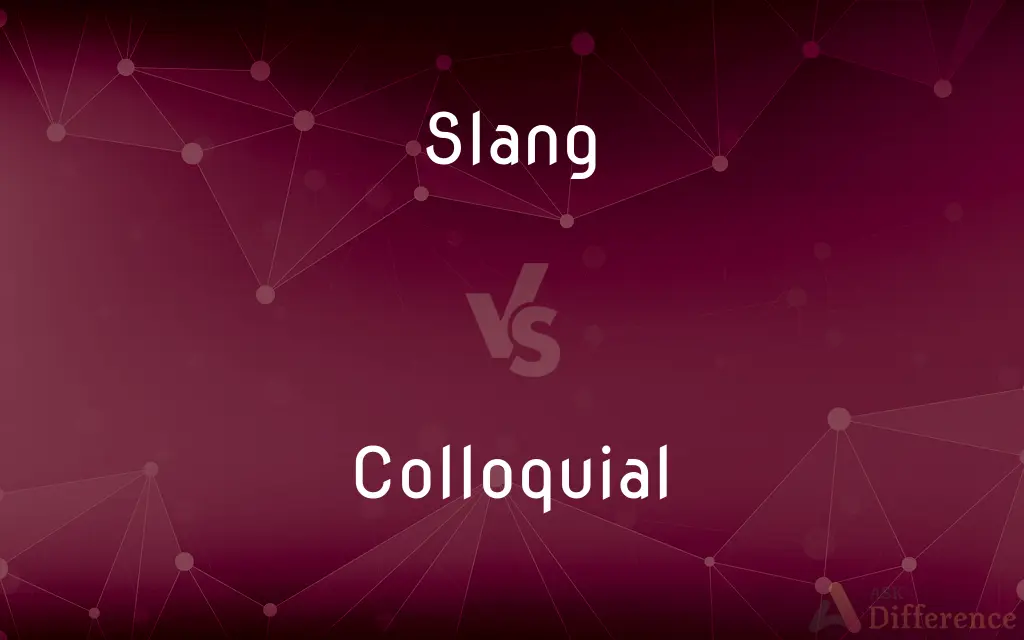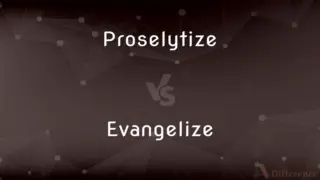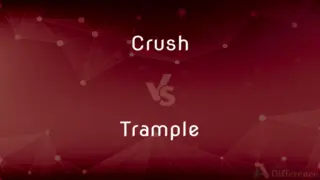Slang vs. Colloquial — What's the Difference?
By Maham Liaqat & Fiza Rafique — Updated on March 14, 2024
Slang is informal, often ephemeral language, while colloquial language is informal but widely accepted in everyday speech.

Difference Between Slang and Colloquial
Table of Contents
ADVERTISEMENT
Key Differences
Slang consists of informal words or phrases that emerge within specific social groups, characterized by innovative and fleeting usage. Colloquial language, on the other hand, includes informal words and expressions that are broadly accepted and used in regular, everyday conversation.
Slang is often tied to particular subcultures, age groups, or social circles, reflecting current trends and identities. Colloquialisms, however, pervade a wider demographic, embedding themselves into the language of a large population or geographical area.
The use of slang can serve as a marker of identity or group membership, distinguishing insiders from outsiders. Conversely, colloquial language acts as a bridge, facilitating communication in a casual, universally understood manner within a language community.
Slang is more likely to change rapidly, with terms frequently falling in and out of favor as cultural dynamics shift. Colloquial language evolves more slowly, maintaining stability and recognizability in casual speech over longer periods.
While slang can sometimes be seen as inappropriate or unprofessional in certain settings, colloquial language is generally acceptable in informal contexts, though it might still be avoided in formal or professional communication.
ADVERTISEMENT
Comparison Chart
Formality
Highly informal
Informal but widely accepted
Usage
Specific groups or subcultures
Broad demographic, everyday speech
Changeability
Rapid, ephemeral
Stable, evolves slowly
Identity
Marks group membership
Common in a language community
Acceptability
May be inappropriate in some contexts
Generally acceptable in informal contexts
Compare with Definitions
Slang
Nnovative and trendy language.
The word lit is slang for exciting or excellent.
Colloquial
Casual, everyday language.
Gonna is a colloquial form of going to.
Slang
Rapidly changes with culture.
Slang terms from a decade ago might now be outdated.
Colloquial
Widely understood within a language.
Colloquial expressions vary from one region to another.
Slang
Sometimes frowned upon in formal settings.
Using slang in a job interview is not advised.
Colloquial
More stable than slang.
Colloquial phrases have been used for generations.
Slang
Reflects group identity.
Skateboarders have their unique slang terms.
Colloquial
Facilitates informal communication.
Colloquial language makes casual conversation more natural.
Slang
Can be exclusive.
Without knowing the slang, it's hard to follow the conversation.
Colloquial
Generally acceptable in informal contexts.
Colloquial language is common in emails between friends.
Slang
Slang is language (words, phrases, and usages) of an informal register. It also sometimes refers to the language generally exclusive to the members of particular in-groups prefer over the common vocabulary of a standard language in order to establish group identity, exclude outsiders, or both.
Colloquial
(of language) used in ordinary or familiar conversation; not formal or literary
Colloquial and everyday language
Colloquial phrases
Slang
A kind of language occurring chiefly in casual and playful speech, made up typically of coinages and figures of speech that are deliberately used in place of standard terms for added raciness, humor, irreverence, or other effect.
Colloquial
Characteristic of or appropriate to the spoken language or to writing that seeks the effect of speech; informal.
Slang
Language peculiar to a group; argot or jargon
Thieves' slang.
Colloquial
Relating to conversation; conversational.
Slang
To use slang.
Colloquial
(linguistics) Characteristic of familiar conversation, of common parlance; informal.
Slang
To use angry and abusive language
Persuaded the parties to quit slanging and come to the bargaining table.
Colloquial
Of or pertaining to a conversation; conversational or chatty.
Slang
To attack with abusive language; vituperate
"They slanged each other with every foul name they had learned from the age of three" (Virginia Henley).
Colloquial
A colloquial word or phrase, colloquialism
Slang
Language outside of conventional usage and in the informal register.
Colloquial
Pertaining to, or used in, conversation, esp. common and familiar conversation; conversational; hence, unstudied; informal; as, colloquial intercourse; colloquial phrases; a colloquial style.
His [Johnson's] colloquial talents were, indeed, of the highest order.
Slang
Language that is unique to a particular profession or subject; jargon.
Colloquial
Characteristic of informal spoken language or conversation;
Wrote her letters in a colloquial style
The broken syntax and casual enunciation of conversational English
Slang
The specialized language of a social group, sometimes used to conceal one's meaning from outsiders; cant.
Slang
(countable) A particular variety of slang; the slang used by a particular group.
Slang
(countable) An item of slang; a slang word or expression.
Slang
(India) A curse word.
Slang
Any long, narrow piece of land; a promontory.
Slang
A fetter worn on the leg by a convict.
Slang
A counterfeit weight or measure.
Slang
A travelling show, or one of its performances.
Slang
A hawker's license.
Slang
A watchchain.
Slang
To vocally abuse, or shout at.
Slang
To sell especially illegal drugs.
Slang
Any long, narrow piece of land; a promontory.
Slang
A fetter worn on the leg by a convict.
Slang
Low, vulgar, unauthorized language; a popular but unauthorized word, phrase, or mode of expression; also, the jargon of some particular calling or class in society; low popular cant; as, the slang of the theater, of college, of sailors, etc.
Slang
To address with slang or ribaldry; to insult with vulgar language.
Every gentleman abused by a cabman or slanged by a bargee was bound there and then to take off his coat and challenge him to fisticuffs.
Slang
Informal language consisting of words and expressions that are not considered appropriate for formal occasions; often vituperative or vulgar;
Their speech was full of slang expressions
Slang
A characteristic language of a particular group (as among thieves);
They don't speak our lingo
Slang
Use slang or vulgar language
Slang
Fool or hoax;
The immigrant was duped because he trusted everyone
You can't fool me!
Slang
Abuse with coarse language
Common Curiosities
Are colloquialisms used in writing?
Colloquialisms can appear in informal writing, like personal letters or dialogue in fiction.
Why does slang change so quickly?
Slang reflects current cultural trends and social attitudes, which are always evolving.
Do older generations use slang?
While often associated with younger people, all age groups can create and use slang.
How does slang affect language?
Slang enriches language by introducing new expressions and words, adding to its diversity.
How can one learn colloquial language?
Immersion in everyday conversations and local media is a great way to learn colloquial language.
Why is colloquial language important?
Colloquial language is important for effective and natural communication in informal settings.
Is colloquial language accepted in academic writing?
Colloquial language is generally avoided in academic writing in favor of more formal language.
What is an example of slang?
"Ghosting" is slang for suddenly ceasing all communication with someone.
Can a slang word become colloquial?
Yes, if a slang word gains widespread acceptance, it can transition into colloquial language.
Is colloquial language less correct than formal language?
Colloquial language isn't less correct; it's just suited to different contexts than formal language.
Are there any risks in using slang inappropriately?
Misusing slang can lead to misunderstandings and might be viewed as disrespectful or unprofessional in certain contexts.
Can colloquial language differ by region?
Yes, colloquial expressions often vary significantly from one region or country to another.
Is it important to understand slang?
Understanding slang can be crucial for effective communication within certain social groups or cultures.
How can one keep up with changing slang?
Engaging with popular culture and social media can help one stay updated on current slang.
Can slang be found in dictionaries?
Some slang terms enter dictionaries once they achieve widespread usage.
Share Your Discovery

Previous Comparison
Proselytize vs. Evangelize
Next Comparison
Crush vs. TrampleAuthor Spotlight
Written by
Maham LiaqatCo-written by
Fiza RafiqueFiza Rafique is a skilled content writer at AskDifference.com, where she meticulously refines and enhances written pieces. Drawing from her vast editorial expertise, Fiza ensures clarity, accuracy, and precision in every article. Passionate about language, she continually seeks to elevate the quality of content for readers worldwide.














































